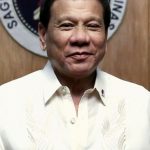Politics
Philippines Politics
This page explores Philippines’s political structure incorporating real-time RSS feed news and videos. By harnessing the power of RSS feeds, visitors can stay informed about the latest developments in Philippines’s politics as they happen. The dynamic nature of these feeds ensures that users receive up-to-the-minute updates on political events, policy changes, and significant milestones, enabling them to stay abreast of the ever-evolving political scene.

Rodrigo Duterte
16th President of the Philippines
Incumbent
Assumed office
June 30, 2016
Image credit
The Philippines, officially known as the Republic of the Philippines, is a democratic country located in Southeast Asia. It operates as a presidential republic with a multi-party system. The political structure of the Philippines is defined by its constitution, which was last ratified in 1987.
At the top of the political structure is the President of the Philippines, who serves as both the head of state and the head of government. The President is elected by popular vote for a single six-year term and has executive powers. The President appoints cabinet members who are responsible for overseeing different government departments and implementing policies.
The legislative branch of the Philippines is a bicameral institution. It consists of the Senate and the House of Representatives. The Senate has 24 members who are elected nationally, with each senator serving a six-year term. The House of Representatives has 297 members who are elected through geographic constituencies, with each representative serving a three-year term. The legislative branch is responsible for making laws, approving the national budget, and providing checks and balances on the executive branch.
The judiciary in the Philippines is an independent branch of government responsible for interpreting and applying laws. The Supreme Court is the highest judicial authority in the country. It is composed of a Chief Justice and 14 Associate Justices appointed by the President from a list provided by the Judicial and Bar Council. The judiciary plays a crucial role in upholding the rule of law, protecting citizens’ rights, and resolving legal disputes.
Political parties in the Philippines play a significant role in the political landscape. There are numerous political parties in the country, and party affiliations often shape political alliances, policy platforms, and electoral strategies. However, individual personalities and personal connections also play a significant role in Philippine politics.
The Philippines has a history of vibrant democratic processes, although it has also faced challenges such as corruption, political dynasties, and socio-economic inequalities. Nonetheless, the country continues to strive for inclusive governance, economic development, and social progress.
Overall, the political structure of the Philippines is characterized by a presidential republic with a separation of powers between the executive, legislative, and judicial branches. The country holds regular elections, allowing citizens to participate in the democratic process and choose their representatives at various levels of government.
Unless other sources are listed, original content is provided by ChatGPT. ChatGPT may produce inaccurate information about people, places, or facts. #Philippines #PhilippinesPolitics #PhilippinesNews #PhilippinesNewsToday #PhilippinesRSSFeed #BlahFace



